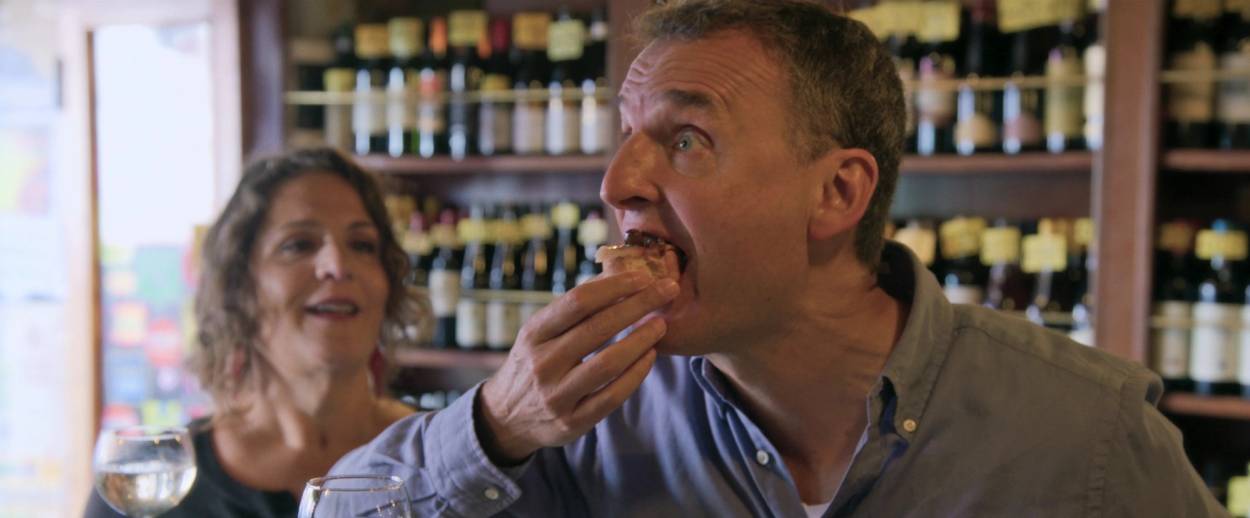Phil Rosenthal Can’t Escape Jewish Food
As the second season of his food show debuts today, the ‘Everybody Loves Raymond’ creator handles babka and rugelach with his infectious warmth and enthusiasm




Wherever Phil Rosenthal goes, he can’t escape Jewish food. The Everybody Loves Raymond creator (and Unorthodox guest!) finds Semitic sustenance in unexpected places. In the six new episodes of his Netflix travel show, Somebody Feed Phil, released today, the wide-eyed Rosenthal continues to travel the globe, satisfying his appetite for food and learning about different cultures. But even while exploring new cities and countries, his own ethnic cuisine is omnipresent.
In this “Second Course” (that’s what Netflix has dubbed the episodes in lieu of Season 2) of adventures, Rosenthal visits his hometown, New York City, and takes viewers to favorite spots like the Peter Luger Steak House in Williamsburg as well as some new popular joints like Pilot, a floating oyster bar docked at a pier by the Brooklyn Bridge. Later, in a hilarious montage, Phil and comedian Judy Gold (another Unorthodox guest!) run wild at Zabar’s. They crack jokes, pick up Fox’s U-bet syrup, and teach a construction worker how to correctly pronounce “rugelach.” At Russ & Daughters Cafe on the Lower East Side, Rosenthal introduces Tracy Morgan to Jewish appetizing food, including egg creams, latkes, bagels and lox, smoked whitefish, matzo ball soup, and herring. “It’s soul food,” Rosenthal tells Morgan, before noting deadpan: “I didn’t say ‘your soul.’”
The episode closes in the kitchen where it all began—his mom’s. Over some matzo-ball soup, we catch a glimpse of his real roots. All that was missing from this episode was some Entenmann’s.
Last season, Phil visited Tel Aviv. He didn’t just learn about Israeli food. In addition to the obligatory hummus feast, he toured Carmel Market, stopped in Caesarea and Galilee, took Krav Maga lessons, and went to a raging Purim party.
Rosenthal seems to happen across Jewish food even when he’s outside of Jewish hubs. Referring to the many spots where Jewish food has surfaced in his journeys (seemingly everywhere), Rosenthal says: “We’re finding them all over the world! And it’s not like I’m looking for them, they find me!”
In Buenos Aires he visits a restaurant called Mishiguene. When Rosenthal learns that his next stop is a Yiddish-named eatery, he laughs and exclaims, “Enough already! How many Jewish places can we go to?” Mishiguene turns out to provide an elegant meal. The chef serves Phil gourmet gefilte fish and pastrami. There are shofars as part of the decor. In New Orleans last season, among the Louisiana delicacies, Rosenthal found Alon Shaya’s eponymous restaurant, which served Israeli food (and babka for dessert).
The world of televised food programming is still feeling the pain of Anthony Bourdain’s recent departure. If you’re looking for a new bite-size binge watch, Somebody Feed Phil might fill that void.
At first glance, the two men could not be more different. Bourdain had a model’s good looks, was hugely knowledgeable about world affairs, and had a palate trained in haute cuisine. Rosenthal is a stark contrast, a nebby guy who seems to know as much about the places he visits as a tourist traveling through Italy after having read Eat, Pray, Love. But this is what makes Phil so charming.
Radiating enthusiasm, he describes every dish he eats with effusive praise; everything, it seems, is “my favorite,” “one of the best,” and “unbelievably delicious.” When he bites into a slice of pizza, his friend quips that Rosenthal’s face “lights up like a Hanukkah bush.” His goodwill is contagious, and he encourages viewers to go on their own food journeys—even if, in my case, it was only as far as the refrigerator.
Elazar Abrahams is a former intern at Tablet, and will attend Yeshiva University after a gap year at Netiv Aryeh in Jerusalem.